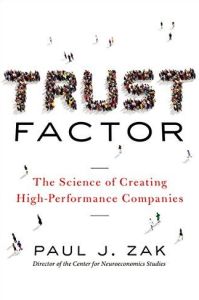Join getAbstract to access the summary!

Join getAbstract to access the summary!
Paul J. Zak
Trust Factor
The Science of Creating High-Performance Companies
HarperCollins Leadership, 2017
What's inside?
Paul J. Zak explains how to build a high-performance business based on soft management and hard science.
Recommendation
While some leaders might decry “softer” management theories, neuroscience proves that treating your staff members like adult human beings and trusted colleagues pays off. In this engaging and accessible read, neuroeconomist Paul J. Zak shows how creating a “culture of trust” can turn around organizations that might be bound for failure. Based on findings from numerous scientific experiments, Zak examines trust, suggests eight areas to focus on, and outlines practical and manageable steps to bolster workplace bonds and employees’ effectiveness.
Summary
About the Author
Paul J. Zak is a professor of economics, psychology and management at Claremont Graduate University, California, where he founded the Center for Neuroeconomics Studies, a research laboratory that studies how people make decisions.























Comment on this summary